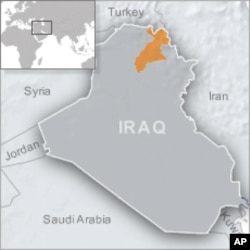Turkish military forces crossed into Northern Iraq this week in pursuit of Kurdish rebels of the PKK. The one day incursion is the first of its kind in two years and is seen as the latest step in a growing escalation in fighting between the Turkish state and PKK. Last year the government announced steps to end the more than two-decade-long conflict. But those efforts have stalled and as hopes of peace are now fading.
Two brigades of Turkish commandos along with special forces crossed the Iraqi border in pursuit of PKK rebels that had attacked a military outpost. The incursion was backed up by helicopter gunships and fighter jets. The operation according to Metehan Demir, a former military pilot and leading journalist in Turkey, was not a surprise.
"It has been long expected operation to actually respond to recent PKK attacks that drew a lot of reaction from turkish society in recent days," he said. "Therefore turkish military and government wanted to do something else. Almost everyday a few turkish soldiers die in clashes.
In the last month couple of months, more than two dozen Turkish soldiers have been killed and scores injured in a major escalation in PKK attacks across the predominantly Kurdish southeast of Turkey.
In the last couple of months, the PKK - Turkish Kurds fighting for greater cultural and political rights since 1984 - have been steadily stepping up their attacks.
This recent incursion is the first of its kind since 2008, when hundreds of soldiers entered Iraq to attack PKK bases.
That drew heavy condemnation from both Baghdad and the regional Iraqi Kurdish government. But this week's incursion drew little political reaction. In the last few years Ankara has dramatically improved relations with the region.
Earlier this month the Iraqi Kurdish leader Masoud Barzani made an historic visit to the Turkish capital. Saffeen Dizayee spokesman for the Iraqi Kurdish government, says this is a new era in bilateral relations .
"I think I can happily say that we are at point where by we are happy with these developments vis-a-vis Turkey's relations with Iraqi Kurdistan and vis-a-vis its own Kurdish issue inside Turkey," he said. "The project that the government has already embarked on is - in itself - a major initiative and think its a very courageous initiative."
That initiative is what the Turkish government's calls its "democratic opening." Launched last year, it seeks to bring an to end the conflict with the PKK, a conflict which is believed to have claimed over 40,000 lives mainly civilians.
But, the project has stalled. On Tuesday Prime Minister Recep Tayyip Erdogan launched a strong attack against the country's main pro Kurdish party, the Peace and Democracy Party.
Acts of terror are without remorse, he says. Exploiting this for politics will not bring peace. Just saying peace won't bring peace. Those who are in direct or indirect contact with the PKK are accomplices to murder.
That attack is already being interpreted by some observers as a hint to possibly banning the party. Already more 1500 members and officials, including elected mayors, have been detained on anti-terror charges. Journalist Demir says the window for peace may have already closed.
"PKK is not, Turkey is not only problem," said Demir. "You know the Gaza crisis, Mavi Marmara, flotilla, is. Also the crisis with the European Union over Cyprus, the United States, the economy, unemployment, constitutional change, the upcoming referendum. There are so many other stakes, that Erdogan cannot stand on his feet easily."
With a presidential election just a year away, those pressures on the prime minister can only grow. Observers say the PKK is expected to further escalate its attacks as hopes of any peaceful solution fades. Those attacks will inevitably claim more Turkish soldiers lives, that will further fuel public anger and calls for tougher military action. Analysts warn Turkey could be on the verge of again descending into a spiral of violence.




